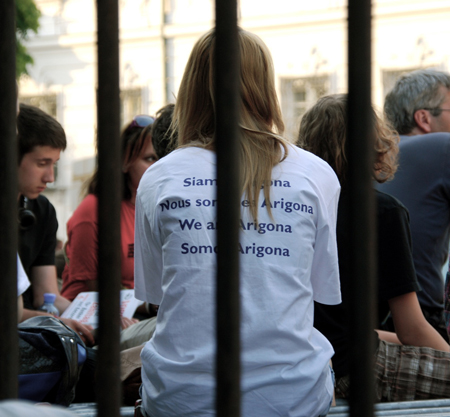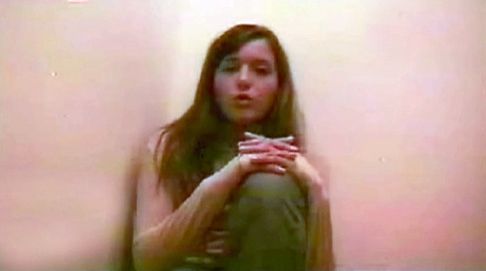VIENNA -– After eight years struggling for asylum, 18-year-old Arigona Zogaj has been ordered by Austria’s highest court to leave her adoptive home in Austria and return to Kosovo, the country she barely knows.
The Zogaj family has been the focus of international media attention since 2007 when, facing deportation, then- 15-year-old Arigona ran away from home and sent numerous letters and a video broadcast threatening to commit suicide if her family was not allowed to stay in Austria.
The young girl’s plight has since been part of a public debate and has garnered the sympathy of many Austrians, some of whom came together at Vienna’s Ballhausplatz square on July 1 under the slogan “Enough is Enough” to protest the country’s increasingly restrictive asylum laws and the last in a series of court decisions that call for the Zogaj family’s deportation.
The thousands of protesters were joined by several prominent public figures, including the Nobel Prize in Literature recipient Elfriede Jelinek who sent an audio message of support.
Anna Babka, a member of Austria’s Green Party who has campaigned for the Zogajes to stay in the country, called the Constitutional Court of Austria’s decision “inhumane.”
“They have nothing there (in Kosovo), and here they are very well integrated,” she said.
In her first emotional appeal to the public in 2007, Arigona spoke in perfect German, an indication of her successful integration in a country where command of the language is often promoted by the government as a measure of both the willingness and the ability of migrants to become a part of the society.
Advocates for the Zogaj family have emphasized their integration into the social fabric of the Austrian town in which they live. Arigona successfully finished her mandatory education and has been going to a school to prepare her for university studies. Many of Arigona’s supporters feared that the court’s ruling of “immediate departure” would mean that she and two of her siblings would not be able to stay in Austria to finish their school year, but the family was allowed several weeks to settle its affairs.

Sign that translates as "No Human is Illegal" at a protest in solidarity with the Zogaj family. (Photo: Jelena Kopanja)
Arigona’s father brought his wife Nurie and their five children to Austria from Kosovo in 2002 even though his original application for asylum had been denied. The family was ordered to leave in 2007, and Arigona’s father and siblings returned to Kosovo. Arigona evaded the expulsion and went into hiding, soon after sending out her desperate plea that mobilized the support of the public and much of the media. Her mother was allowed to stay in the country and look for Arigona who, it turned out, was being harbored by a local priest. Mother and daughter were granted a permission to stay in Austria until Arigona’s school year was over.
In 2008, Arigona’s father abandoned the family in Kosovo. In an act of desperation upon hearing the news, Arigona’s mother tried to commit suicide. Both Nurie and Arigona were diagnosed as suffering from emotional distress, a condition that prolonged their stay in Austria where they could receive adequate health assistance. In 2009, the four Zogaj children attempted to reenter Austria through Hungary, succeeding on their second attempt. Since then, the two eldest brothers have voluntarily gone back to Kosovo, while Arigona, her mom and her two younger siblings remain in Austria.
Austria’s asylum laws, considered to be among the toughest in Europe, have become even more restrictive and convoluted in the past few years, “bordering arbitrary,” as the major newspaper Der Standard reported. The latest changes that took effect in January 2010 add five new grounds for the detention of asylum seekers facing deportation. Earlier this year, the Interior Minister Maria Fekter suggested an additional mandatory detention of all asylum-seekers– for up to 28 days while their applications are reviewed.
Fekter has often linked migrants and asylum seekers to security concerns, reinforcing a criminal image that both local NGOs and international human rights bodies like UNHCR have criticized.

Woman wearing a "We are Arigona" shirt in solidarity with the Zogaj family's quest for asylum. (Photo: Jelena Kopanja)
Some say that Arigona’s case is an opportunity for the conservative People’s Party (OEVP) Minister Fekter to prove herself as a hardliner when it comes to immigration, one of the most prominent and contentious issues on the country’s political agenda. The right wing has been unwavering in their opposition to the family’s stay and has welcomed the court’s decision, saying the Zogajes should have left a long time ago. Even the left-leaning Social Democratic Party’s (SPOE) response has been weak, according to Stefan Etzelstorfer, a member of Socialist Youth Austria.
The Green Party, on the other hand, has been consistent in its support for the Zogajes and has turned in 10,000 signatures to Austria’s president Heinz Fischer , who, while hoping for a humanitarian solution, said that the court’s decision must be respected.
Minister Fekter urged the family to leave voluntarily, warning that a forced deportation would mean that they could not return to Austria for the next 18 months.
The Zogajes are getting ready to go, and are spending their last days in the country saying goodbye to friends and suppoters. Arigona’s school said that they would gladly accept her, should she return in the fall.
Once in Kosovo, some of the family members could apply for one of the limited number of seasonal worker visas that would allow them employment in several specific sectors such as agriculture or construction. Arigona could also seek a student permit, a visa that had been denied to her siblings in the past. While the Interior Minister Fekter suggested at one point that she could marry an Austrian citizen, this is not an option for the 18-year-old Arigona as she would need to be 21 in order to do that.
The family could also take their case to the European Court of Human Rights in what is likely to be a lengthy procedure that must be initiated outside of the country.
Etzelstorfer, who knows Arigona personally, says he will not give up.
“We will try to force the discussion in public and to support Arigona if she wants to come back,” he said.





